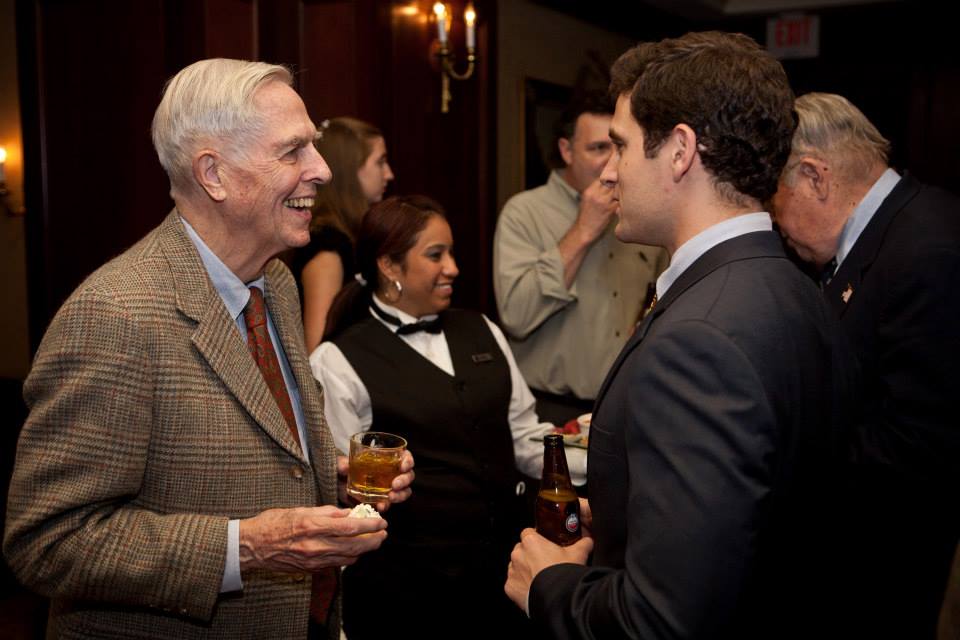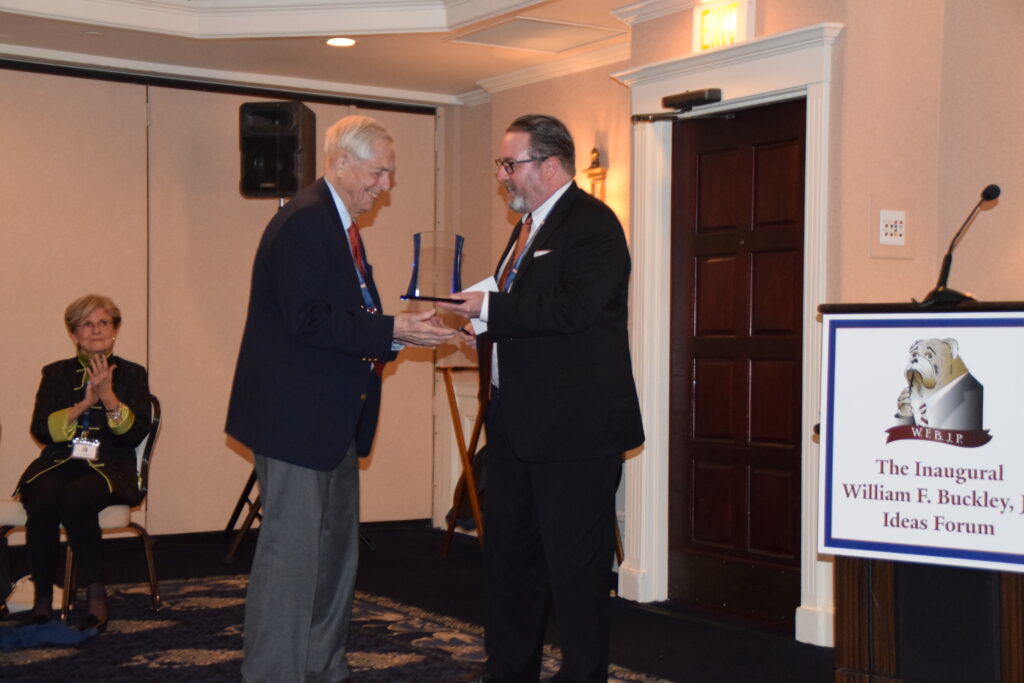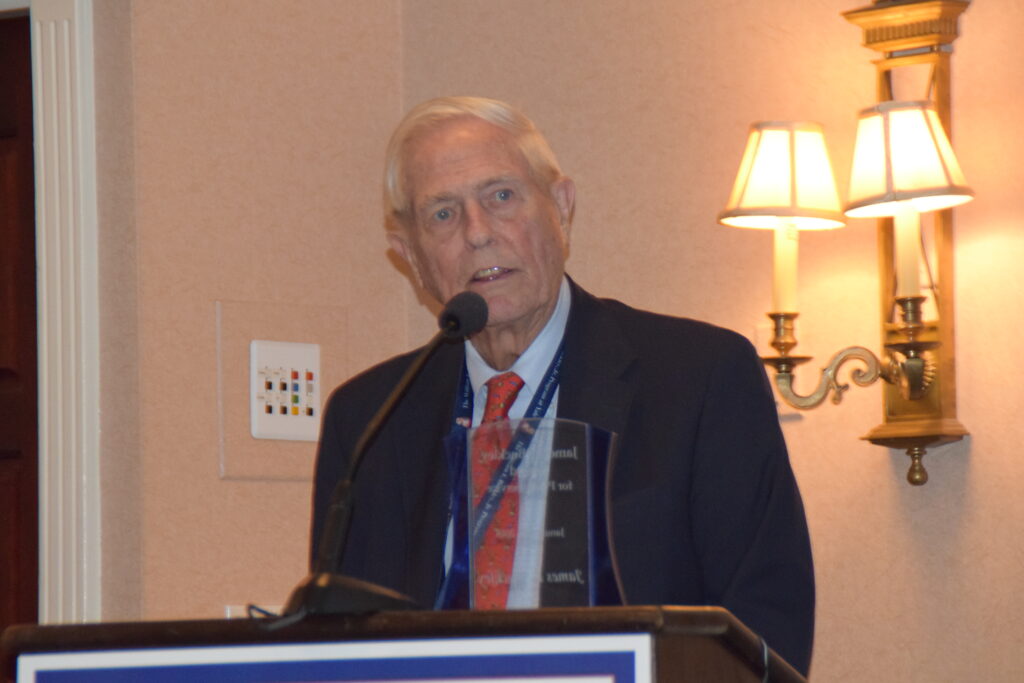
Buckley Institute Mourns Passing of Hon. James L. Buckley ’44, Emeritus Director
We are saddened by the passing of the Honorable James L. Buckley ’44, Emeritus Director of the Buckley Institute Board of Directors, at the age of 100.
Judge Buckley was a long-time supporter of the Buckley Institute’s efforts. He was one of the first members of the Buckley Institute’s Board of Directors. In that role, he was instrumental in guiding and shaping the growth of the organization in its early years, allowing it to become the major voice at Yale and across the country that it is today.
Judge Buckley was also one of the Buckley Institute’s first guest speakers, addressing a group of Yale undergraduates over lunch in March 2011. In October 2013, he gave opening remarks at our annual conference Gala on the Future of Conservatism.
The Buckley Institute recognized Judge Buckley in February 2018 with the inaugural James L. Buckley Award for Public Service, which was named in his honor.


Judge Buckley will be missed deeply by the Buckley Institute for his contribution to our efforts, to his alma mater, and to the country.
“Jim Buckley was not only a principled public servant who served our country in all three branches of government with distinction, but he was also a model of graciousness and humility,” said Buckley Institute Founder and Executive Director Lauren Noble ’11. “I was honored when he agreed to serve as one of the first members of our Board of Directors in 2011. When you’re a student starting a new organization, the people who take a chance on you and lend their name to the cause early on make a real difference. I am grateful for his service.”
“It was with sadness that I received this news this morning that my friend James Buckley had gone to his reward,” said Buckley Institute Chairman of the Board Roger Kimball. “I say ‘sadness,’ but not surprise. Anyone who has joined the 100-year-old-club can no longer surprise us by their passing, only their longevity. Jim was an amazingly spry member of that select club: ever buoyant, even boyish in his quiet and disarming friendliness. I met Jim around the turn of the millennium at his younger brother Bill’s Manhattan headquarters at 73 East 73rd street (where events were always scheduled for 7:30). The occasion was the publication of one of Jim’s books. He was modest, decorous, exuding an air of faint surprise that so many people should be congregated at his celebrated brother’s house to celebrate him, former U.S. senator, under secretary of state, and federal judge. The vicissitudes of life in New York and Sharon, Connecticut threw us together often, and we became friends. I published two of Jim’s book at Encounter Books, Freedom At Risk: Reflections On Politics, Liberty, and the State in 2010 and Saving Congress From Itself: Emancipating the States and Empowering Their People in 2014. I kept angling for another, but it was not to be. Jim’s extensive experience equipped him well for his authorial tasks, for he knew first hand the workings of government in all its aspects. Over the years he watched as an insatiable bureaucratic apparatus gobbled up one province of individual initiative after the next. Both of his Encounter books are partly pathologist’s reports, partly tocsins warning us to slough off our dogmatic slumbers and seize our birthright as free citizens of a republic in which self-government, not nanny-state tutelage, is the ideal. Jim was a founding board member of the William F. Buckley, Jr. Program at Yale. He saw from the beginning that its ambitions had to be free of the parochialism of Yale, and it was his idea that we change the name, and the course of the enterprise, by rebaptizing it the Buckley Institute, something we finally got around to doing earlier this year, not so long after Jim took emeritus status. I last saw Jim about a year ago for lunch in Washington, D.C., a city he cordially disliked. He was somewhat hampered by back trouble but inveterately serene. Like everyone at the Buckley Institute, I shall miss him, his day-brightening smile, his reticent but sure-footed wisdom. Requiescat in pace.”
Buckley served as a United States senator for the state of New York and as a judge for the United States Court of Appeals for the District of Columbia Circuit. Judge Buckley also served as an under secretary of state and, later, as President of Radio Free Europe during the Reagan administration. He was the lead petitioner in the landmark Supreme Court case Buckley v. Valeo, which shaped modern campaign finance law. Judge Buckley authored three books, including Freedom at Risk: Reflections on Politics, Liberty, and the State. He was a graduate of Yale College and Yale Law School.
